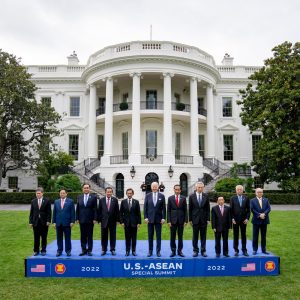U.S. President Joe Biden will attend next month’s G-20 summit in India, but at the cost of skipping the U.S.-ASEAN Summit and East Asia Summit in Jakarta, the White House announced yesterday.
In a statement, the White House said that Biden will travel to New Delhi from September 7-10 to attend the G-20 Leaders’ Summit. There he will with other G-20 leaders discuss “a range of joint efforts to tackle global issues, including on the clean energy transition and combating climate change, mitigating the economic and social impacts of Putin’s war in Ukraine,” among other things.
The White House also confirmed an earlier Reuters report stating that Biden would not attend the clutch of ASEAN meetings that will take place in Indonesia in the first week of September.
That will instead be attended by Vice President Kamala Harris. Together with ASEAN leaders, the statement said, Harris “will review the unprecedented expansion in U.S.-ASEAN relations under the Biden-Harris Administration and the Vice President will reaffirm the United States’ enduring commitment to Southeast Asia and ASEAN centrality.”
Biden is also expected later in September – the date has not yet been confirmed – to make a state visit to Vietnam, where the two nations are expected to establish a strategic partnership.
There is a temptation to argue that Washington’s commitment to “ASEAN centrality” is undermined by Biden’s non-attendance at the important summits. But countless priorities are vying for the president’s attention, and sometimes difficult decisions have to be made.
While attendances at ASEAN meetings are important as a signal of U.S. commitment, it is hard to be too critical of the administration’s choice to prioritize the G-20 and Vietnam. Biden’s visit to Hanoi is expected to result in a concrete outcome – one that aligns the form of the U.S.-Vietnam relationship with the content – while the G-20 includes a host of U.S. partners and allies, including Australia, Canada, France, Germany, India, Japan, South Korea, and the United Kingdom, as well as the European Union and current ASEAN chair Indonesia.
While one can always wish for more, the Biden administration has done a decent job at bolstering engagement with Southeast Asia and its regional organization since coming into office at the beginning of 2021. In both 2021 and 2022, Biden attended the ASEAN-U.S. and East Asia summits, in the former case by video link, while senior officials including Harris, Defense Secretary Lloyd Austin, and Secretary of State Antony Blinken have each made multiple trips to the region. The administration also convened the first U.S.-ASEAN Special Summit in Washington in May of last year.
The past two years have seen noted advances in the U.S. partnership with the Philippines, while the relationship with Vietnam is primed for a significant upgrade. There is still a good deal to do, not least to revive the stagnant alliance with Thailand. But as I’ve argued previously, the greatest lacuna in U.S. policy towards Southeast Asia remains economics and trade – something that will not be immediately affected by the president’s attendance at next month’s meetings.
All told, it would have been better if Biden could have managed a side-trip to Jakarta – but one skipped meeting is unlikely to do significant damage to U.S. relations with the important region.

































